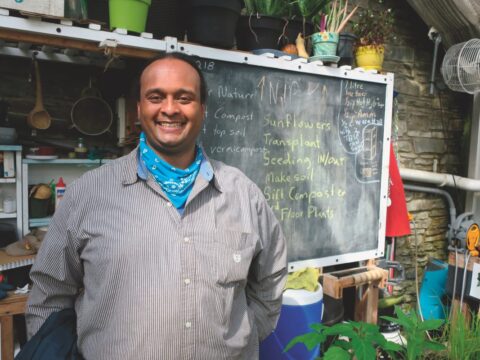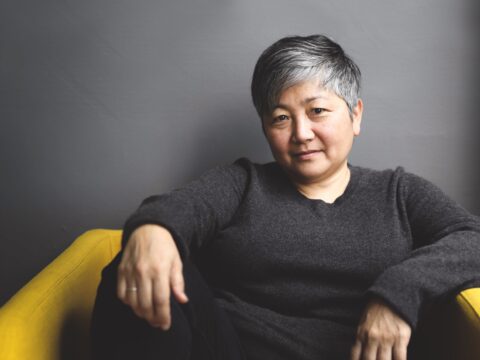Jordana Wright is the founder and managing director of Activate Space, a social enterprise that helps congregations excel as community hubs. She also hosts Things to Talk About at Coffee Hour, a Facebook Live show of courageous conversations about the United Church.
On where her work began: I had been working in community planning for small community development organizations and then larger city builders. I was working on a project that involved a church, and I had this distinct moment when I felt like I was sitting on the wrong side of the table and I was meant to be working on behalf of the church. I’m glad I went with it and leaned into it fully. It was a leap of faith.
More on Broadview:
- Why some U.S. Christians want Target to stop carrying a bestselling book of prayers
- Society still has a problem with women saying ‘no’
- In their own words: What young people of colour want in mentors
On sustainability: Big old church buildings are expensive to maintain, and a lot of traditional sources of funding that used to cover costs aren’t enough to sustain them while also adequately supporting the increasingly complex missional work required of modern faith communities. A third of the country’s approximately 30,000 faith properties are projected to close over the next few years, along with all the essential civic resources that churches house — neighbourhood food banks, winter shelters, affordable performance venues, recreation facilities and way more — as congregations shrink and age and face more challenges with their buildings.
One way that I found to buck this trend is to help churches formalize and expand their de facto role as community hubs. The first key service of Activate Space is to help churches partner with local changemakers, and transform their relationships with community groups that already casually use their space into more meaningful holistic partnerships. The second service is to secure alternative financing opportunities through partnerships with municipalities or local anchor institutions.
On her show: It grew from something I’d been doing for organizations interested in working with me or Activate Space. To live into a bold vision of what church and being in community might mean, you need to be open to new things and being with different people, so I would circulate via email an online show and make sure that churches were hearing from new voices. I decided to bring it to the broader church during the pandemic because I saw the way it brought people together and energized communities.
On being a different voice: I’m not clergy, and I’m in no way what you’d traditionally envision as someone who would lead these kinds of discussions. People are tuning in to hear these conversations about serious issues facing the church or to watch me making jellied salad from an old UCW cookbook, and they’re seeing a young Black woman. It’s an opportunity for people to see the church from a different lens and hear a different voice; it’s rare that you see someone like me viewed and accepted and championed as an expert. I think I’m bringing a perspective that is new and needed. Maybe I’m one of the first young Black women doing this work on this scale, but I don’t want to be the last. I’m seeing an incredible diversity of people who normally wouldn’t want to be involved with the church say how cool this is and ask how they can be involved. So many people are excited about the United Church who otherwise wouldn’t be. I tell them it’s not easy in that you probably won’t be invited to the table — you have to build your own.
***
This interview has been condensed and edited for length and clarity.
This story first appeared in Broadview’s April/May issue with the title ‘I’m bringing a new perspective.”
CORRECTION: An earlier version of this online piece stated 30,000 faith properties could close soon. The piece has since been updated.
















The author presumes there will be a ‘physical’ congregation present in the converted buildings. Where are the demographic studies that indicate people will be able to run community centers if they cant keep their churches open. My advice to aging communities in the UCC. You paid for the buildings through decades of faithfulness. You paid for capital improvement and the operational expenses. If you are a declining congregation seriously consider selling the building and remaining an active congregation in a rented or smaller space. The church’s first priority is the worship of God. From worship flows everything else. And than before the last member leaves give all the money you have left to your own local charities that would benefit the community you live in. Make sure the money you have invested in your faith community and local community.
I’m not an expert on this, but I see many issues financially with (what I think is a great thought process) the ideas presented.
First is the costs of making most churches disabled accessible.
If you open the building to the greater public you have the costs of elevators, ramps, accessible washrooms and for older churches access to various rooms. Another cost is upgrading kitchen facilities to meet the demands now placed on it as well as the cost of most Health regulations. If the building is currently in ill repair, again a cost to maintain safety standards.
A previous article in Broadview noted churches merging. This is doable in larger towns and cities, and I think the best action, but pride gets in the way and parties must agree on which property stands, or both sold and relocated. If a church is shrinking and aging, I need to ask “Who’s fault is it?” Did we think that people would forever support our faith? The Israelites thought they were invincible and look where that got them.
Outreach programs do not need a church basement to function in most places, small storefronts are a much better way to reach the public in my opinion, people frequent village squares (especially in tourist towns) and often drive past the churches in the outskirts.
You lost me on you being black. Why would I care? I would hope you are trying to support the denomination because you care, not because you “stand out”.
Why not position the Church as a place where people can manage life’s transitions biblically? From childhood to taking on responsibilities; from dating to marriage; from multitasking job children and relationships; from mid life to becoming a senior; from growing old to dying.
No other institution does this.
A sacramental perspective helps.